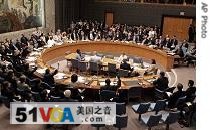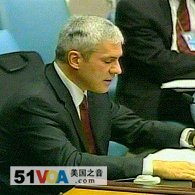United Nations
23 March 2009
 |
| U.N. Security Council (file) |
Serbian President Boris Tadic hurled the first charges, saying that 13 months after its unilateral declaration of independence, Kosovo is not a state.
He said there is minimal protection of human rights and that attacks continue against minority Kosovo Serbs.
 |
| Serbian President Boris Tadic (file) |
"Serbia, together with a number of European Union member-states, faces tremendous problems arising out of the activities of the ethnic-Albanian mafia, which specializes in the trafficking of narcotics, human beings and weapons," he said.
Kosovo's Foreign Minister Skender Hyseni said it is Serb-run areas of Kosovo that have turned into a refuge for criminals.
"The situation in the north remains an issue of utmost concern," he said. "Lawlessness, with evident support of the leadership in Belgrade, has turned this part of Kosovo into a safe haven for all kinds of criminal and illegal economic activity."
Hyseni said that while Kosovo tries to make cooperation with all of its neighbors a top priority, Serbia tries to obstruct it by blocking Pristina's participation in regional and international bodies.
He also accused Belgrade of "encouraging, even blackmailing, even threatening" members of the Serb community not to work with the Pristina government or to integrate with the majority. But he said that despite such actions, his government is ready to engage in direct talks and to normalize relations with Belgrade.
Monday's meeting of the Security Council was to discuss a report from the U.N. secretary-general on the situation in Kosovo. The United Nations and the European Union oversee the police and judiciary in Kosovo.
In presenting the report, U.N. special envoy Lamberto Zannier said that although the situation in Kosovo has been relatively calm since his arrival eight months ago, tensions persist and that more is required of both Serbia and Kosovo.
"While both Pristina and Belgrade have made noteworthy attempts to maintain the peace in the face of potentially destabilizing situations, equally, both have stopped short of where we need to be in order to feel confident that Kosovo is well and truly launched onto the path of lasting peace and prosperity," he said.
Serbia continues to reject Kosovo's independence and is urging countries that have not recognized Kosovo to wait for a non-binding opinion from the International Court of Justice on whether its independence is legal. So far, 56 countries have recognized Kosovo's independence and many, including the United States, say it is "irreversible".